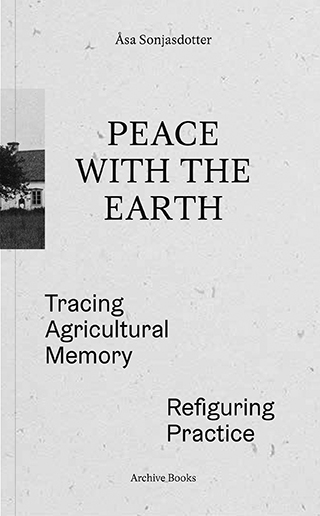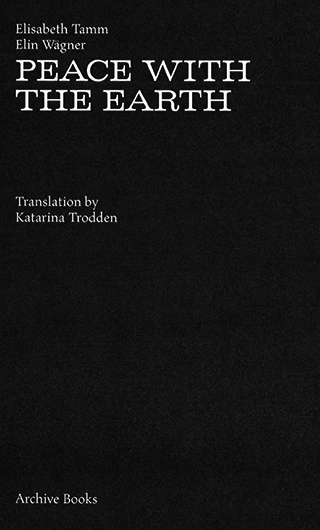The pamphlet Peace with the Earth (Fred med Jorden) was published by the Swedish suffragettes and peace activists Elisabeth Tamm and Elin Wägner in 1940, after the outbreak of the Second World War. Here follows the introductory chapter:
The earth was not created by human hands
but human hands have claimed the land.
Yet the Earth cannot be owned. If it is abused, it suffers and ceases to give.
For as long as they farm the land, each generation answers to past and future generations. They hold in trust all the knowledge that their fathers and mothers before them have accumulated over centuries. They have been given a legacy to look after, and they must not allow it to be violated through ruthless exploitation of natural resources.
Legend has it that there was a time when humans were more aware of being part of a greater whole. Even the most illiterate person could appreciate that plants and animals are children of the Earth, just like humans, and that humankind could only prosper by living in harmony with them. When these people fed and clothed themselves, built their dwellings and made tools from nature’s supply, they deliberately avoided disturbing the natural balance of forces within the realm in which they existed.
Although this may be seen as a childish way of life, disturbing the subtle equilibrium by thoughtlessly taking advantage of the opportunities offered by modern science is an unfortunate choice.
Even the most educated people can learn from the ways in which ancient humans dealt with nature’s creation. We need to acquire, or reacquire, a deep enough knowledge to work with nature instead of against it. Modern inventions must be assessed on the basis of how well they function in harmony with nature. Everything that kills nature’s autonomy must go, or we will.
The authors of the present publication wholeheartedly subscribe to the prevalent historiography, as it gives men credit for the events that have contributed to humankind’s domination over the earth, the oceans, and the air. Once upon a time, man’s efforts required the blessing of religion; we even find it in the form of a divine command that came to play a major role in our culture. The decree that calls for mankind to conquer the Earth and all the creatures that walk upon it no longer applies, because this has already occurred. Humans have usurped all that lives, grows, and moves on the surface of the Earth in accordance with the cosmic laws and the dormant forces that dwell in its bowels in the form of water or coal, oil or minerals. The Earth has been plundered and torn apart as men struggled amongst themselves to gain access.
Nature was forced to retreat at an increasingly rapid pace. Her free processes were restricted; the demand for her services to humankind grew even greater.
The Earth eventually began to revolt, but it was a silent, slow revolt that humans did not heed, for there was yet more virgin land to conquer. Because they had become divorced from the land, humans could not understand the symptoms and did not see the correlation between cause and effect. They despised the Earth as much as they impressed themselves with their own power in the belief that they could turn nature into a blind and willing slave to their every command. In Sweden, we are not entirely unaware of the hardships other nations suffer as a result of the protesting Earth. We are, however, exceptionally reluctant to recognise the symptoms when they appear at home.
*
This arrogant desire to own land has resulted in terrible fights between individuals and nations over the spoils. In order to allow for a free exchange of goods, each and every one must be prepared to subordinate themselves. This does not suit those who have become accustomed to dominating the land, and it is the ultimate reason for the war that has stricken the Earth and humankind with military dictatorships and claims to sole ownership. Humans may well stay on the path to death and destruction for all eternity, but the Earth cannot contribute an endless supply of means for its own destruction through ruthless exploitation and warfare. This will be the bitter lesson of the war that is currently raging.
*
If we apply our way of thinking to land ownership, it is clear that this is another area that will suffer. During the course of history, the claims of landowners — and of sovereign states — have become increasingly absolute. In our opinion, this cannot go on, not even in principle. It has, in fact, already ceased to apply in many places as a result of insolvency and invasion.
It will not be possible to reconnect with the Earth until women are won over. The Earth needs women and women need the Earth is our motto in the section in which we present our rationale for a new world order, as we perceive it, and discuss how it can be achieved.
One section in this publication — in fact, its principal message — is dedicated to a proposal for revising and extending the hereditary leasehold legislation. It aims to facilitate the transfer of this simultaneously ancient and modern form of the right of possession from paper to the real world.
The question of population density must also be included in this view on land ownership. In the long term, it will benefit humankind to resist turning the entire planet into agrarian land and exploiting it. The Earth must be allowed to keep large land areas left in peace. It must be granted a certain amount of freedom for life to exist in all its diversity: water, rock, and soil; flora and fauna. If this statement is true, humans must stay within the boundaries of those areas that are suitable for agriculture; and here, too, we must proceed with caution.
One of the many reasons for the dramatic population increase in the last hundred years must surely be that the close connection between a family and its potato patch was no longer taken for granted, as an entire segment of the population that had previously lived off the land was separated from it through the process of industrialisation. When this connection is re-established, people will start to look at things differently.
Against the prevailing principles of mechanisation, specialisation, and speed, we have chosen to proclaim a set of ideals that we believe will be relevant in the world of tomorrow:
Self-sufficiency — diversity — patience.

